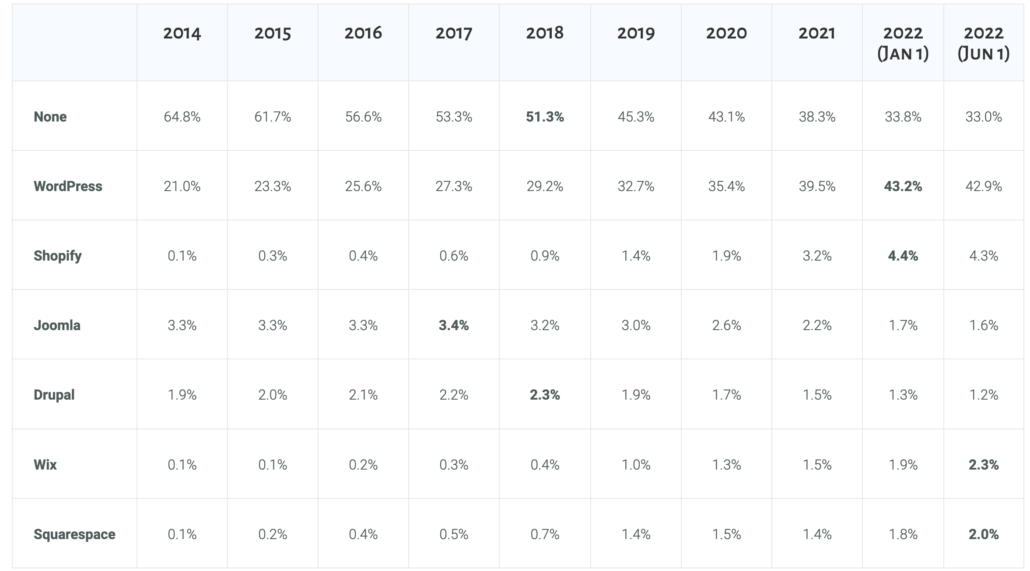WordPress developer – who is he, and what does he do?
A good WordPress developer is concerned with creating websites based on WordPress. But before we get started with the full definition, let’s first cover some facts about WordPress and what it means to be a WordPress developer:
Who is a WordPress developer?
WordPress developers write code to build websites, e-commerce stores, and web applications. They use their knowledge of the PHP programming language and are skilled at building blocks in React to create functional, attractive and user-friendly websites. If you are interested in web development and want to understand its intricacies, knowing about this role can help you decide to become a WordPress developer. In this article, I will discuss the role of a WordPress developer, learn about their average salary and the skills and steps required to become one.
WordPress is a free, open-source blogging tool and a content management system (CMS) based on PHP and MySQL. WordPress was used by more than 32.5% of the top 1 million websites in June 2019 and accounts for 43% of the market share in 2022. WordPress is the most popular blogging system used on the web, with over 60 million websites.
It follows that many people can use WordPress even without being PHP experts, and since it is an open-source CMS, anyone with basic web skills can use WordPress to create websites.
However, that certainly doesn’t qualify them as WordPress developers or programmers. Some WordPress opponents often claim that the WordPress development community has lowered the bar for web development, leading to a situation where true experts are no longer as necessary as they were in the past.
WordPress has convinced many amateurs with no talent or education that they are web developers because they can set up a WordPress site, load a theme, and install a few plugins. But they don’t know how to write HTML code, much less CSS, JavaScript, SQL or any other server-side programming language.
To be considered a WordPress expert, an individual should have a strong understanding of the WordPress platform, including its core features and functionality. This includes knowledge of the WordPress content management system (CMS), as well as experience with customizing WordPress websites using themes and plugins.
In addition to this technical knowledge, a WordPress expert should also have strong programming skills, including experience with HTML, CSS, and PHP. They should also be familiar with web development tools and technologies, such as JavaScript and MySQL.
Other essential skills for a WordPress expert include the ability to work with clients to understand their needs and requirements and to deliver high-quality solutions that meet their needs. They should also be able to troubleshoot and debug WordPress websites and have experience with managing and maintaining WordPress websites over time.
Overall, the skills required for a WordPress expert will vary depending on the specific tasks and responsibilities of the job. However, in general, a WordPress expert should have a strong foundation in WordPress and web development, as well as the ability to apply these skills to create high-quality WordPress websites.
Why WordPress?
WordPress (especially the self-hosted version, which you can download from WordPress.org) is incredibly flexible and easy to get up and running. While WordPress was originally a blogging platform, the ecosystem that has developed since then allows you to do just about anything with a WordPress site. Whether you’re building a news site, landing pages, or an eCommerce platform, WordPress can handle it all.
WordPress is a content management system (CMS), which means it’s an application that allows you to create digital content and publish it online. One of the main differences between using a CMS like WordPress and using HTML and CSS is that you don’t have to individually edit and then reload each page of your site whenever you want to add content to it. Instead, you can manage your site pages through the WordPress user interface and simply hit the “Publish” button to apply your changes. Of course, more complex and custom tasks require a more profound knowledge of coding, but it’s the ability to make simple changes without coding that allows clients to make essential updates to their site on their own once it’s built.
It’s also possible to run an online e-commerce store on WordPress. That’s why I help entrepreneurs create and expand their online businesses as a WooCommerce developer.
What does a WordPress developer do?
Today I transitioned from freelancer to small business owner. I typically do projects for other small business owners who have moved beyond the do-it-yourself website development stage and need a professionally built WordPress site that is integrated with other services such as email marketing systems, appointment scheduling systems, or shipping and accounting platforms for e-commerce.
As a WordPress developer, the first thing I do each day is checking my website monitoring and support ticket system in case there are any “emergency issues” that I need to work on – broken pages, hacked pages, white screens of death, etc. If that’s the case, those issues become my priority. If they do occur, they become my priority. After setting aside any crises, I check email (which I try to contain only three times a day. Otherwise, it can distract me and turn into an all-day time-waster), take care of any minor household tasks that need to be done, and then move on to my main work.
At least once a week (though sometimes more often, depending on the current state of security), I test backups of all the WordPress sites I manage and make sure the software those sites use is up to date. I also run weekly security scans of the sites and performance monitoring. Once this type of maintenance is complete or on days when it is unnecessary, I move on to the development portion of my job. Depending on how many side projects I have in progress, I spend several hours working on them. This includes things like planning the site, creating custom themes, installing or modifying plugins, creating pages, and completing content. In addition to maintaining, managing, and building the site, I set aside an hour or two each day for professional development. It’s easy to lose yourself in the immediacy of the projects you’re working on, but it’s essential to stay up to date with both the technology you’re using and the general ins and outs of freelancing or running your own business. I stay current by employing several services that provide training on topics related to WordPress, coding in general, and business management.
WordPress developers use technical skills and soft skills.
For anyone looking to get into WordPress web development, it’s important to emphasize that – while learning as much as you can about the WordPress platform and building a solid general foundation of coding and technical skills are key components of working in this industry – you’ll also need to cultivate your “non-technical” skills. In between coding classes, take some time to learn project management – whether you’re working for yourself or someone else, the ability to scope a project, define requirements, and anticipate and plan work is invaluable. Also, always improve your communication skills – more projects fail due to poor communication than any other reason. And finally, plan for everything! I’ve learned in both my military and business careers that if something isn’t on the calendar, it won’t get done – but don’t forget to schedule a time to take care of yourself! The beauty of working with WordPress, and web development in general, is that more often than not, you can create your schedule or at least some time flexibility, but it’s up to you to use that flexibility to get the best results.
The typical work environment of a WordPress developer
WordPress developers spend a significant amount of time sitting at a computer and working with a mouse and keyboard. They may or may not work as part of a team, but they will always be working with a client of some sort. Light travel and meetings at various locations should be expected from time to time.
Due to the nature of this position, remote working is possible, which will provide more flexibility in meeting style and work environment.
Typical working hours of a WordPress developer
Typical working hours for a WordPress developer are 9 am to 5 pm in the office. Or it’s flexible hours if you work remotely from your home.
Available certifications for WP developers
Since WordPress developers work in various industries, many institutions offer certifications, including:
WordPress Academy. Skillshare offers this introductory WordPress course with step-by-step guides and instructions to get you up to speed. With occasional discounts and free trials, this is a significant first step into the world of WordPress. A career path in web development. Codecademy offers this essential certification for anyone who wants to make a severe living creating websites. You’ll learn the basics of web development, learn several programming languages like HTML and CSS, and move on to more complex topics like databases. These skills will not only contribute to your success but will also round you out as a programmer and help you later when you move on to higher-level jobs.
Creating WordPress Themes. Udemy course offers this certification to help you learn how to create highly responsive themes using Bootstrap Framework. You will learn the basics of creating page styles and creating versatile and dynamic content. It is recommended that you know the languages you will need to work with WordPress before taking this course.
Learn PHP. This certification offered by Codecademy validates your knowledge of the primary language used on the WordPress platform – PHP. This course will teach you everything you need to know about the language, and upon completion, you will have an excellent level of knowledge about the inner workings of the platform as you learn how it works from the ground up.
What does the career path of a WordPress developer look like?
WordPress developers typically enter the industry with high school education. More technical positions may require a four-year college degree, preferably in computer programming or a related field. Knowledge of WordPress is a must, but some candidates with certifications in web programming may qualify.
Trends in WP developer jobs
According to the industry website Torque, one trend that will affect all web developers shortly is the rise of chatbots, which are becoming more “human” by the day. Voice search is also rapidly gaining popularity as a core technology for both business and personal purposes. Blockchain technology, including WEB3, is becoming particularly popular in the financial sectors; it will undoubtedly also impact the development of plugins and content monetization on WordPress sites.
Sample WordPress Developer Interview Questions
- Can you describe what a WordPress plugin is?
- Where is the content stored?
- What is the difference between posts and pages?
- What are hooks? What are their functions?
- What is an action hook?
- What is a filter hook, and how does a filter hook work?
- How to enable debug mode? What is a taxonomy?
- What is a post type, and what does it do in a WordPress table?
- What are the default tables in WordPress?


